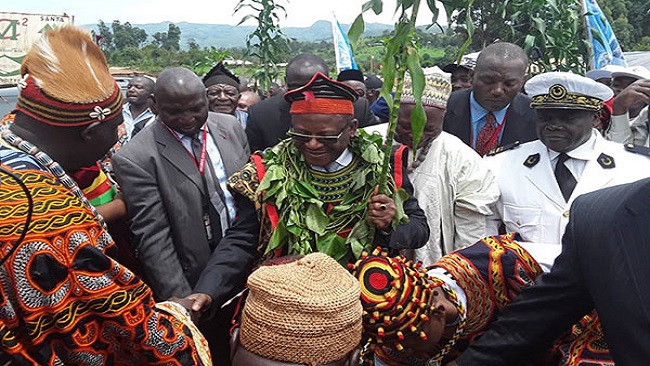Testing the waters: Dion Ngute in first visit to Southern Cameroons
Cameroon’s Prime Minister Joseph Dion Ngute on Thursday began a one week visit to the conflict-hit English speaking Northwest and Southwest regions hoping to find a political solution to the escalating violence and the ensuing humanitarian crisis.
During the visit from May 9 -16 the first by the premier since his appointment last January, Dion Ngute will discuss with community leaders and other groups key to finding a lasting solution to the incessant violence.
The prime minister was received in Bamenda by a traditional ruler as he arrived holding a peace plant.
The visit is in line with the governments efforts to resolve the conflict in the face of international pressure from among others the United Nations and the European Union. In contrast the Africa Union has stood by the non-interference clause contained in its charter despite calls from civil society groups for it to act.
The visit comes less than a week after the UN Commissioner for Human Rights Michelle Bachelet Jeria warned that the crisis was getting out of hand and the window for reconciliation closing.
Killings, torching of villages and kidnapping for ransoms and other human rights abuses perpetrated by both government troops and armed groups fighting for the secession of the two English speaking regions to establish a new state called Ambazonia continue to be reported almost on a daily basis.
Last week the International Crisis Group (ICG) reported that 1850 people have been killed and 530,000 displaced in clashes in the past 20 months as the government and the separatists refuse to cede ground for talks.
The May 2 report said lack of concessions could generate more violence and prolong the conflict.
“Both sides must explore compromise solutions aimed at a level of regional autonomy somewhere between the secession desired by the separatists and the fake decentralisation proposed by Yaoundé,” ICG advised.
It called on Cameroonian and international actors to encourage the two sides to make concessions including by rewarding the less intransigent and sanctioning those who stand in the way of dialogue.
Violence erupted in the Cameroon’s two English speaking regions when an industrial strike by aggrieved lawyers and teachers in 2016 over perceived marginalization turned into a clamour by armed separatists for outright independence of the region.
Ambazonia, as the separatists identify the region, was administered as part of Nigeria as a UN trust territory under British control prior to reunification.
“The separatists continue to dream that independence is just around the corner. In Yaoundé, the government still wrongly believes it can win a quick military victory,” the ICG report said.
In a separate report four days later, Human Rights Watch (HRW) said Cameroon authorities have regularly tortured and held incommunicado detainees arrested in the government’s crackdown on the English-speaking armed separatist movement.
HRW said it had documented 26 cases of incommunicado detention and enforced disappearance between January 2018 and January 2019 at the State Defence Secretariat (SED) detention centre in the capital Yaounde.
Besides the armed separatist movement in the Anglophone regions, Cameroon faces multiple other challenges including persistent threat by Boko Haram jihadist group in the Far North, political tensions and a growing number of refugees fleeing violence in neighbouring Nigeria and the Central African Republic.
The divisions in the country have seen two major opposition political parties announce a boycott of the 47th National Day celebrations on May 20.
The Social Democratic Front (SDF) of Ni John Fru Ndi and the Cameroon Renaissance Movement (MRC) of Prof Maurice Kamto have separately announced they will not be part of the celebration whose rallying call is “Unity in diversity.”
The SDF said the boycott was in “strong protest of the decaying state of the nation” and in sympathy to the suffering of Cameroonians caught up in the civil war and other crisis across the country.
“As long as the civil war and this severe insecurity prevails, the SDF cannot participate in the National Day Celebrations on May 20. One side of the face cannot be smiling while the other side is crying,” the party’s 2018 presidential candidate Joshua Osih said. It said the government had turned a deaf ear to dialogue. The boycott was also in protest to the continued incarceration of its leader Maurice Kamto and other supporters.
Prof Kamto was arrested in January for organizing post-election protests and is standing trial before a military court in Yaounde on charges of rebellion, insurrection and “hostility to the homeland.”
The opposition leader was arrested alongside 116 of his supporters while taking part in the demonstrations dubbed “white marches” which were suppressed by security forces.
Prof Kamto maintains that he was the winner of the October 2018 presidential poll, but official results showed he emerged a distant second with 14.23 percent behind Paul Biya with 71.28 per cent.
Boycotts of state functions, however, are of little significance in Cameroon.
Two years ago SDF boycotted the ceremony to push for labour rights and an inclusive electoral code.” The party went on to participate in the 2018 presidential election under the same electoral code and political dispensation.
The opposition Cameroon People’s Party (CPP) has not taken part in any National Day parade since 2016 citing violation of freedoms.
Its leader and 2011 presidential candidate Kah Walla said the day has lost meaning as the government continues to ignore divisions and opportunities to unify the country.
Source: The East African





